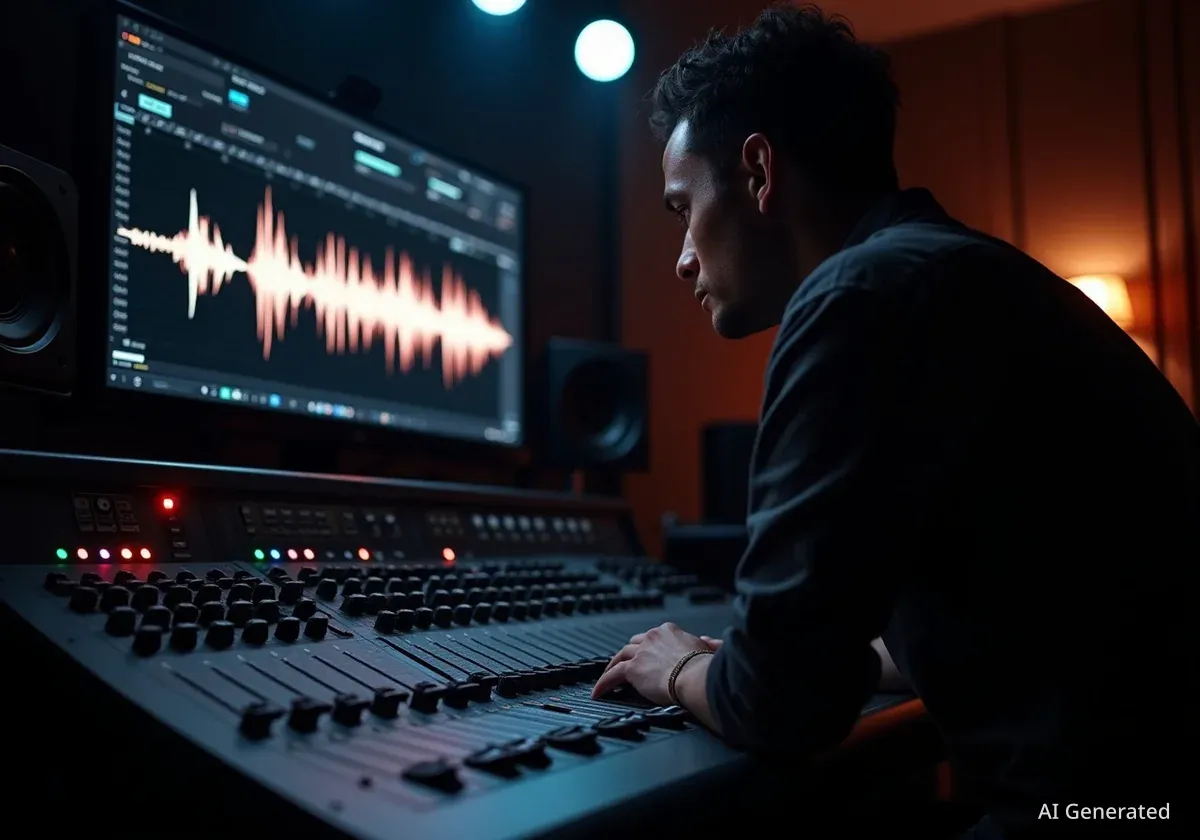Flemming Rasmussen, the former producer for the legendary band Metallica, recently discussed the long-standing mystery surrounding the almost complete absence of bass guitar on their 1988 album, '...And Justice for All'. Rasmussen, who has worked on several Metallica albums, remains unable to fully explain the band's decision to minimize bassist Jason Newsted's contributions in the final mix.
The album, known for its complex arrangements and heavy sound, has been a topic of debate among fans and critics for decades due to its distinctive lack of low-end frequencies. Rasmussen's insights shed new light on the events during the mixing process, though the definitive reason for the bass removal remains elusive.
Key Takeaways
- Producer Flemming Rasmussen still questions the lack of bass on '...And Justice for All'.
- Rasmussen noted the bass tracks were well-recorded by Jason Newsted.
- Lars Ulrich and James Hetfield made the final decisions on the bass levels.
- Possible reasons include grief over Cliff Burton's death and hazing of Jason Newsted.
- The album has inspired many new bands despite its controversial mix.
Rasmussen's Initial Reaction to the Mix
Flemming Rasmussen has a long history with Metallica, having produced their albums 'Ride the Lightning' (1984) and 'Master of Puppets' (1986) before '...And Justice for All'. His relationship with the band included a tradition where drummer Lars Ulrich would play him new mixes for feedback.
During a recent interview with Chilean radio station Futuro, Rasmussen recounted his first listening experience of the '...And Justice for All' mix. He was immediately struck by the missing element.
"Lars [Ulrich] has a thing that every time they've done an album, he comes and plays it to me," Rasmussen explained. "And he always hopes that I nod and say, 'That's a good lad.' And when he came and played … And Justice for All for me, I just looked at him and said, 'What's that?' He said, 'That's the mix.' I said, 'No, it's not. You forgot the bass.' But there's no bass on there."
This reaction highlights the stark difference between the album's final sound and what a producer would typically expect. The bass guitar, a fundamental part of any metal band's sound, was conspicuously absent.
Album Facts
- '...And Justice for All' was released on August 25, 1988.
- It was Metallica's first album with bassist Jason Newsted.
- The album sold over 8 million copies in the U.S.
- It received a Grammy nomination for Best Hard Rock/Metal Performance.
The Mixing Process and Band Decisions
Rasmussen's involvement with '...And Justice for All' was initially uncertain due to other commitments. However, Metallica persuaded him to join them in Los Angeles to help complete the album. By the time he arrived, mixing engineers Steve Thompson and Michael Barbiero were already working on the tracks.
According to Rasmussen, the band was not satisfied with the initial mixes. He recalled Metallica's reaction when they first heard the work of the Los Angeles mixers.
"By the time I got there, they already got some hotshot Los Angeles mixers, Steve Thompson and Michael Barbiero, to mix it," Rasmussen stated. "And the story is that Metallica flew in, listened to what they'd done, and they went, 'No, no, no.' 'Where's my drum sound?' 'Where's my guitar sound?' And actually Lars said, 'Now take the bass down so you can just hear it.'"
This instruction was followed. Then, Lars Ulrich requested a further reduction in bass levels. "They did that. You can see it on YouTube. There's plenty of videos of Steve Thompson talking about this. And then once they'd done that, he said, 'Take it three dB [decibels] more down.'"
Rasmussen emphasized that the ultimate decision rested with Ulrich and guitarist James Hetfield. "So, it's Lars and James that decided, and why they did that, I've asked them a thousand times. I do not know." This confirms that the lack of bass was a deliberate choice made by the band's core members.
Speculations on the Bass Absence
Despite directly asking the band, Rasmussen has never received a clear answer for the decision. However, he has developed his own theories regarding why Jason Newsted's bass was almost entirely removed from the final mix.
One primary speculation involves the band's ongoing grief over the death of their previous bassist, Cliff Burton. Burton died in a bus accident in 1986 at the age of 24, just two years before '...And Justice for All' was released. Newsted had joined the band as his replacement.
"I think the reason why they turned the bass down, 50% of it is because they were on tour with Van Halen, and they flew in and heard the mix," Rasmussen suggested. "And I think that's the point where Lars and James realized, 'We don't have Cliff anymore. It's not his bass. It's a totally different sound.' And I just think they couldn't relate to that at that point."
This theory suggests an emotional component to the decision, where the new sound of Newsted's bass, different from Burton's style, was difficult for Ulrich and Hetfield to accept while still mourning their former bandmate.
Background on Cliff Burton
Cliff Burton was Metallica's bassist from 1982 until his death in 1986. He was known for his unique, virtuosic playing style and significant songwriting contributions to albums like 'Ride the Lightning' and 'Master of Puppets'. His sudden death had a profound impact on the band and its members.
Another theory Rasmussen put forward relates to the documented hazing Newsted endured upon joining Metallica. Newsted faced a challenging integration into the band, often subjected to pranks and difficult treatment by the other members.
"What they hated most about Jason was that he was such a Metallica fan," Rasmussen said. "So every time they asked him anything, he just did it. So I think they took it down just to piss him off, 'cause they were expecting him to say, 'Can you turn the bass up?' And he probably never did. That's why the bass is so low."
This perspective suggests a more deliberate, almost punitive, reason behind the mixing decision, aimed at provoking a reaction from Newsted. However, Newsted remained silent about the issue during his time in the band.
The Quality of Jason Newsted's Bass Tracks
Despite the final mix, Rasmussen confirmed that Jason Newsted's actual bass performances were of high quality. As one of the few individuals who heard the isolated bass tracks, he praised Newsted's musicianship.
"As one of the few people in the world who has heard the bass [tracks] on ... And Justice for All, I can just say Jason did a hell of a job," Rasmussen declared. "They sound really good. They are really good bass tracks."
This statement adds another layer to the mystery, as it confirms the decision to reduce the bass was not due to poor performance. The quality of the bass playing was not a factor in its removal from the final mix.
The Album's Lasting Impact
While the mixing controversy has persisted, '...And Justice for All' holds a significant place in music history. Rasmussen highlighted an unexpected positive outcome of the album's unique sound.
"The funny thing is that, in hindsight, I read somewhere recently that ... And Justice for All is the number one album in the world that people say is the reason why they started their own band," he noted.
This suggests that the album, despite its sonic quirks, resonated deeply with aspiring musicians. Its raw, aggressive sound, even without prominent bass, inspired a generation to pick up instruments and form their own groups.
Rasmussen added, "So ... And Justice for All has created more new bands than any other album in the world. So if you want to start a new band, don't be a bass player." This humorous remark underscores the album's unique legacy.
The album's influence on heavy metal is undeniable. Its complex song structures, intricate riffs, and dark lyrical themes pushed the boundaries of thrash metal. Even with the controversial bass mix, the album remains a landmark release for Metallica and the genre.
Metallica's Legacy of Album Openers
Metallica has a history of impactful album openers, each setting the tone for the record that follows. From the aggressive "Battery" to the iconic "Enter Sandman," these tracks often define the band's evolving sound.
- "Battery" ('Master of Puppets'): Often considered their best opener, featuring a classical acoustic intro transitioning into ferocious thrash.
- "Fuel" ('Reload'): An adrenaline-fueled track showcasing the band's later-era energy.
- "Fight Fire With Fire" ('Ride the Lightning'): A powerful opener with a signature acoustic intro leading into a thrash metal assault.
- "Blackened" ('...And Justice for All'): The opener for the discussed album, a fan favorite and the namesake of their record label.
- "Hardwired" ('Hardwired… To Self-Destruct'): A concise, hard-hitting track that marked a strong return to form for the band in the modern era.
- "72 Seasons" ('72 Seasons'): The title track from their 2023 album, exploring themes of early life development.
- "Frantic" ('St. Anger'): Notable for its unique drum sound and raw intensity.
- "Enter Sandman" ('Metallica'): A globally recognized riff that became one of their most successful singles.
- "Hit the Lights" ('Kill 'Em All'): The band's very first released song, a foundational thrash metal track.
- "Ain't My Bitch" ('Load'): Represented a shift in sound for the band in the mid-90s, asserting their independence.
- "That Was Just Your Life" ('Death Magnetic'): A solid opener from their 2008 album, featuring classic Metallica elements.
Each opener reflects a specific period in Metallica's long career, demonstrating their continuous evolution while maintaining a core identity. The ongoing discussion about '...And Justice for All' highlights the deep connection fans have with the band's musical choices and their impact.
Ultimately, the mystery of the missing bass on '...And Justice for All' continues to fascinate. While Flemming Rasmussen has offered plausible explanations, the definitive reason remains a subject of ongoing discussion among Metallica fans and the music industry.




